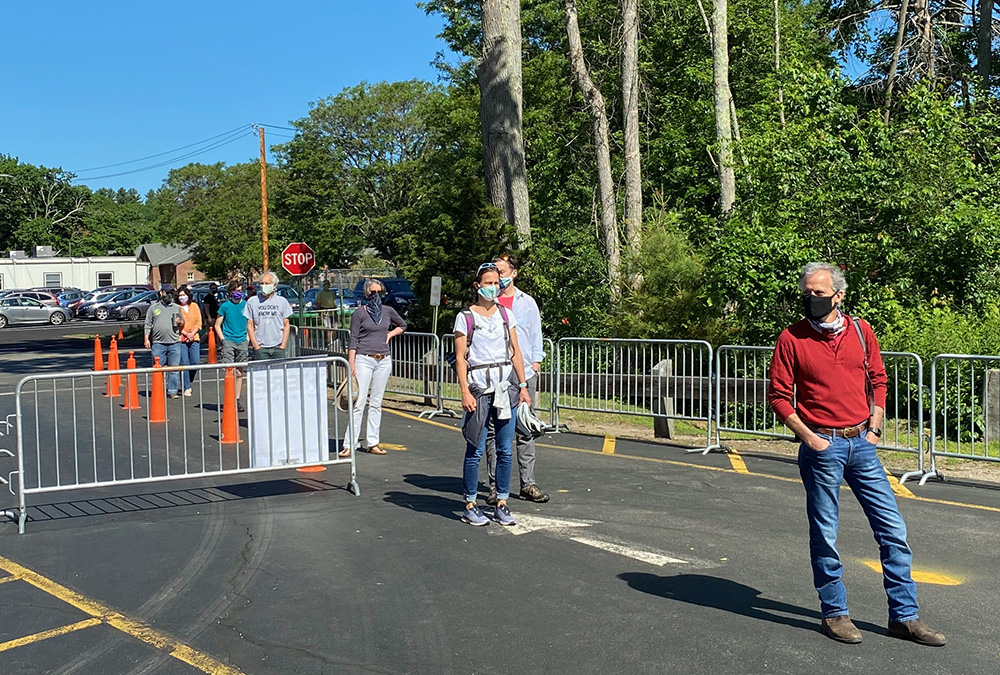
Voters line up in the Hartwell parking lot driveway to check in for Town Meeting on June 13. See more photos below. (Photo by Alice Waugh)
By Alice Waugh
It was a Town Meeting like no other. Instead of lasting hours with hundreds of people packed in a stuffy auditorium, the June 13 event took place in the fresh air under an enormous tent where chirping birds competed with the amplified voices of the speakers. All three warrant articles were approved, and the whole thing was over in less than 90 minutes.
About 150 residents (all in masks) sat alone or in socially distanced pairs under a gigantic tent that occupied most of the Hartwell parking lot, secured by stakes driven through the asphalt. Another 130 who couldn’t fit in the allotted space in the tent sat outside in lawn chairs or on the pavement in the bright sunshine. Questions were submitted in writing and read aloud by runners to minimize microphone handling.
Everyone was given a small orange card to hold up while voting to avoid the need for calling out loudly and perhaps spreading aerosolized virus — but there was a small hitch. Town Moderator Sarah Cannon Holden noted that the town’s bylaws require a voice vote, “so I’m asking you to speak softly and raise your bright orange cards.” A soft chorus of “ayes” signaled each vote.
The agenda was pared down from the 40 warrant articles planned for March to 21 crucial financial articles. Eighteen of those articles focusing on the town budget, including Capital Planning Committee (CapCom) and Community Preservation Act (CPA) items, were unanimously approved with no discussion in a single consent-calendar vote.
As expected, most of the discussion focused on a request by the School Building Committee to move $829,000 from free cash to the school building project to pay for some of the items that were cut when bids came in $3.5 million over budget. Before Covid-19 turned things upside down, the SBC had planned to ask for $2.02 million to restore 19 items at Town Meeting in March. The eight items funded by Saturday’s vote amount were outlined in a June 4 public forum on Zoom.
Several residents were not happy about the SBC request. “The School Building Committee was given a very large amount of money. How many more times will you come to Town Meeting asking for yet more money?” said Jeanine Carlson. “We taxpayers have to live within our budget. Why don’t you?”
“We do not take lightly how much things have changed in the last few months,” SBC chair Chris Fasciano responded, noting that it had significantly scaled down its request since early March based partly on discussions with the Finance Committee. “We have made no decisions about coming back to the town or not coming back to the town. We are in a very uncertain time and we need to see how things unfold before we make that decision.”
Some of the other cuts, such as bike paths and walkways, playground equipment, and new trees, could be restored in the future with funding from sources such as the CPA, CapCom, or a potential Complete Streets Grant. But Fasciano acknowledged that funds that were cut from the budget for furniture, fittings, and equipment will have to be restored, either within the School Committee or SBC budgets, or by direct resident vote. Private donations are also a possibility, although town officials are not permitted to engage in fundraising.
“At some point, some or all of that [$750,000] will need to come back to the town,” he said. Much of that amount will go to replace old and worn furniture, as little or none has been replaced in the past 10 years as the town was trying to finalize a school project.
After the vote, the town still has $1.5 million in free cash, which — along with $2.2 million in the debt stabilization fund — makes up the town’s $3.7 million emergency reserves, FinCom chair Andy Payne said.
Former FinCom member Peyton Marshall also questioned the wisdom of allocating more money for the school.”Many of us in town have had to reconsider or are looking at our plans to remain in Lincoln,” he said. “I think we’ve gone far enough in spending money on town buildings and schools. Should we be prioritizing buildings or people?”
But others spoke in favor of the measure. When she first heard of the request to go before voters, one resident said she thought the SBC must be “very brave or very foolish, but then I read the list and though, ‘My goddess, this is going to impact actual learning in the classroom.” The allocation won’t raise taxes any further, “so it’s not going to show up in our mailboxes, but it will show up in the learning.”
There were about a dozen “nay” votes on the measure seeking $829,000 and three or four against a related measure to transfer $325,000 from the town’s cable TV fund to the cable TV infrastructure in the Donaldson Auditorium, which is normally used for Town Meetings.
Marshall was the only one to vote against the $270,000 Water Department borrowing request. Water Commission chair Ruth Anne Hendrickson explained that $125,000 of that was needed due to “the same sad story” — a previously funded item where bids came in over budget. She outlined the needs in detail before a June 9 public forum on Zoom.
In July, consultants will begin studying long-term options for Lincoln’s water supply, including switching to water from the MWRA. And starting next year, Water Department capital requests will go before the FinCom and the CPC before coming up for Town Meeting votes. This hasn’t been the case before, because the department operates as an enterprise fund independent of the town budget, whereby revenues from user fees are supposed to cover most of its costs.
Click images below for expanded versions and captions:
[Best_Wordpress_Gallery id=”145″ gal_title=”Town Meeting 2020-2″]
Leave a Reply